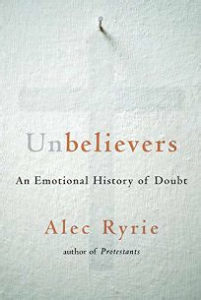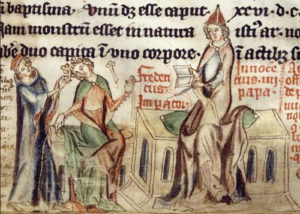Unbelievers: An Emotional History of Doubt

BY ALEX RYRIE
BELKNAP PRESS
272 PP.; $27.95
In his book Unbelievers: An Emotional History of Doubt, author Alec Ryrie, a professor of the history of Christianity at Durham University in England, sets out to give a broad history of unbelief based not so much on logic as on emotions—more specifically, anger and anxiety. This works on some levels, but on others Ryrie fails to draw a large enough picture of the emotional history. Still, he brings an enlightened and erudite touch to his argument after he confesses to being “a believer with a soft spot for atheism.”
Unbelievers begins in 1239 with the pope accusing Frederick II, the Holy Roman Emperor, of being an atheist for calling Moses, Jesus, and Muhammad “charlatans” and “deceivers.” The pontiff also charges that one of Frederick’s advisors had written a book called The Three Impostors arguing this same position.
As would be the case over the next five hundred years, the truth seems to have fallen far short of the charge. There is evidence that Frederick II may have been at least asking uncomfortable questions of his advisors, but what’s more in evidence is that the pope and Frederick II were bitter political rivals. And there is (unfortunately) no evidence that The Three Impostors ever existed, although its rumored existence and changing authorship over five centuries was regularly repeated as evidence by accusatory officials. (Some enterprising Frenchmen did write a book with this title in the early 1700s, apparently hoping to benefit from its already infamous reputation.)

Emperor Frederick II being excommunicated by Pope Innocent IV
This outlines a problem Ryrie has to deal with throughout the book—that the history of unbelief is one written by devout believers, so “atheist” is a term thrown about quite liberally as an attack against specific individuals with whom they had disagreements, and is used as a general bogeyman. The hard evidence of unbelief must be gleaned from those many instances where atheism is alleged but rarely admitted. In fact, most charged with atheism admit rather to different beliefs on the nature of God, not no belief at all.
Still, Ryrie’s history is fascinating for the insights those trials and charges do provide. For instance, a recurring theme is the suspicion of doctors for harboring disbelief. This is due chiefly to their development of the scientific method through observation, correlation of symptoms with certain environmental factors (rather than with demons), and their reporting on those results, placing “undue emphasis upon nature in…opposition to faith.” A seventeenth-century proverb states: “where there are three physicians, there are two atheists.”
Things really start to percolate during the Renaissance, especially with the discovery of previous lost manuscripts of Cicero, Pliny the Elder, and especially Lucretius’s On the Nature of Things. These works suggest a world view governed by nature or chance and the notion that there is no life after death—a truly revolutionary blow the church rightly saw as undercutting its whole theological system. That these ideas were even advanced became a source of concern to church authorities.
On the heels of the Renaissance came the Reformation, where questioning the church took on a new immediacy. Ryrie does a nice job of outlining how, while most of the Reformation’s push was to reform rather than reject, the types of questions being raised by reformers were inevitably taken farther than even those reformers meant them to go.
Ryrie hits his full stride as a storyteller in going through the many different forms of unbelief that came about in the period following the Reformation, especially in his home country of England. He is a capable writer with a good eye for the illustrative detail. Unfortunately, for those looking more for a history of atheism, almost all of the stories he tells are of people who still believed in God, although their God was very different from the God of either Catholicism or Anglican Protestantism. Things became especially vicious during the English Civil Wars of the mid-1600s, where each side, convinced that their interpretation of Christianity was correct, routinely accused the other of a sort of atheism, although both sides agreed that if you didn’t take a side, you were definitely an atheist “since anyone who had no opinion about the nation’s divisions evidently believed in nothing at all.”
Later in the book, Ryrie starts to corral his historical review in favor of his thesis that most unbelief came about as a result of two things; either anxiety, brought on by the believer who tried to reconcile the word of God as read with the word of God as it was being preached, or anger at the obvious hypocrisy they saw around them in terms of corrupt priests and church officials, or religion being used by political forces for their own political ends.
While this is a useful construct, it also seems to leave out an even more fascinating strain that Ryrie usefully identifies in the introduction but leaves largely unaddressed throughout his main argument. In defining an atheist, he quotes the seventeenth-century essayist Thomas Fuller, who states that a “practical atheist” is “not someone who thinks there is no God, but someone who thinks not there is a God.” Within this small difference, a huge world of unbelief seems to dwell. A “practical atheist” doesn’t deny God but rather finds the idea of God not to be a useful one. Instead, this person’s ethics are shaped by their simple experiences in the daily world.
It’s an idea that Ryrie does seem to come back to in his last few pages. Here he summarizes the world of the last century or so, and traces the West’s movement away from religion to a more generalized humanist ethic. This ethic, he argues, is based in a strangely perverse way on Adolf Hitler, who came to personify what humanism and ethics should NOT be—a sort of negative definition. In doing so, society has left behind the Bible and religion as a guide to what ethics should be, adopting by default a stance that a “practical atheist” would recognize. This example of a negative figure whose views of ethics must be rejected is being retold today in fictional characters like Sauron in The Lord of the Rings, Darth Vader in Star Wars, and Voldemort in Harry Potter.
This is fascinating stuff, but not explored beyond a summary few pages. One gets the sense that if he’d started off with this thesis, the interesting history he uncovered would have a different flow and nuance and would have given a more satisfying result. Still, this is a good book for the interested reader, and in examining the story of unbelief through the centuries we can explore a side of history that has largely been ignored.
